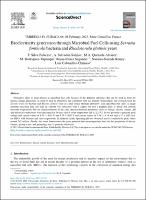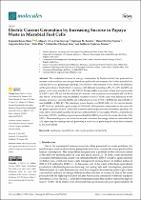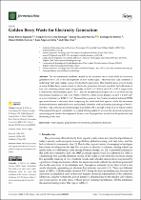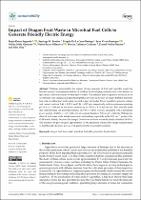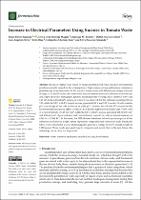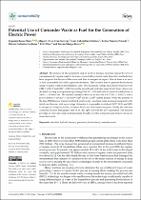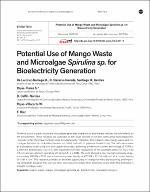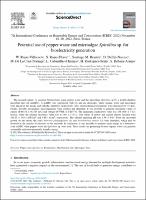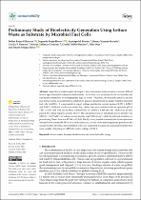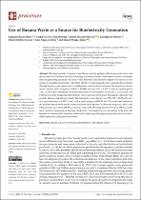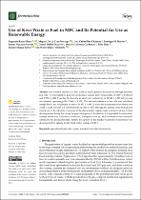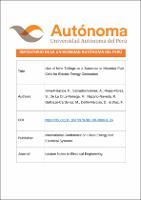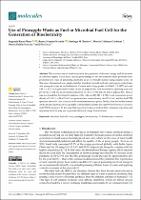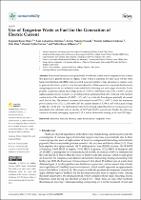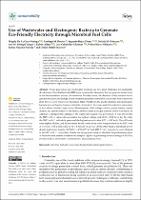Browsing by Subject "Bioelectricity"
Now showing items 1-16 of 16
-
Bioelectricity generation through Microbial Fuel Cells using Serratia fonticola bacteria and Rhodotorula glutinis yeast
(Elsevier, 2023-06-11)Acceso abiertoNowadays, there is great interest in microbial fuel cells because of the different substrates that can be used in them for electric energy generation. In order to find an alternative and contribute with eco-friendly ... -
Eco-friendly Generation of Electricity Using the Bacteria Proteus Vulgaris as a Catalyst
(Springer Link, 2023)Acceso restringidoThe increase in the human population has generated the search for new ways to generate sustainable electrical energy in various ways, among which microbial fuel cell technology has been investigated. In this research, the ... -
Electric Current Generation by Increasing Sucrose in Papaya Waste in Microbial Fuel Cells
(MDPI, 2022)Acceso abiertoThe accelerated increase in energy consumption by human activity has generated an increase in the search for new energies that do not pollute the environment, due to this, microbial fuel cells are shown as a promising ... -
Golden Berry Waste for Electricity Generation
(MDPI, 2022-05-27)Acceso abiertoThe environmental problems caused by the excessive use of fossil fuels for electricity generation have led to the development of new technologies. Microbial fuel cells constitute a technology that uses organic sources for ... -
Impact of Dragon Fruit Waste in Microbial Fuel Cells to Generate Friendly Electric Energy
(MDPI, 2023-04-27)Acceso abiertoPollution generated by the misuse of large amounts of fruit and vegetable waste has become a major environmental and social problem for developing countries due to the absence of specialized collection centers for this ... -
Increase in Electrical Parameters Using Sucrose in Tomato Waste
(MDPI, 2022-07)Acceso abiertoThe use of organic waste as fuel for energy generation will reduce the great environmental problems currently caused by the consumption of fossil sources, giving agribusiness companies a profitable way to use their waste. ... -
Potential Use of Coriander Waste as Fuel for the Generation of Electric Power
(MDPI, 2023-01-04)Acceso abiertoThe increase in the population and its need to produce food has caused the level of contamination by organic waste to increase exponentially in recent years. Innovative methods have been proposed for the use of this waste ... -
Potential Use of Mango Waste and Microalgae Spirulina sp. for Bioelectricity Generation
(Environmental Research, Engineering and Management, 2022)Acceso abiertoPotential use of organic waste and microalgae generates bioelectricity and thereby reduces harmful effects on the environment. These residues are used due to their high content of electron-generating microorganisms. However, ... -
Potential use of pepper waste and microalgae Spirulina sp. for bioelectricity generation
(Elsevier, 2023)Acceso abiertoThe research aimed to generate bioelectricity using pepper waste and the microalgae Spirulina sp by a double-chamber microbial fuel cell (dcMFC). A dcMFC was constructed with Cu and Zn electrodes, where organic waste and ... -
Preliminary Study of Bioelectricity Generation Using Lettuce Waste as Substrate by Microbial Fuel Cells
(MDPI, 2023-06-30)Acceso abiertoAgricultural waste negatively impacts the environment and generates economic difficulties for agro-industrial companies and farmers. As a result, it is necessary for an eco-friendly and sustainable alternative to managing ... -
Use of Banana Waste as a Source for Bioelectricity Generation
(MDPI, 2022-05-09)Acceso abiertoThe large amounts of organic waste thrown into the garbage without any productivity, and the increase in the demand for electrical energy worldwide, has led to the search for new eco-friendly ways of generating electricity. ... -
Use of Kiwi Waste as Fuel in MFC and Its Potential for Use as Renewable Energy
(MDPI, 2023)Acceso abiertoThis research aimed to use kiwi waste as fuel to generate bioelectricity through microbial fuel cells. It was possible to generate an electrical current and voltage peaks of 3.807 ± 0.102 mA and 0.993 ± 0.061 V on day 11, ... -
Use of Mine Tailings as a Substrate in Microbial Fuel Cells for Electric Energy Generation
(Springer Link, 2023)Acceso restringidoIn order to find an alternative for the reuse of mining effluents and contribute with eco-friendly technologies that cover the high demand for energy, this research evaluated the use of mine tailings as a substrate for the ... -
Use of Pineapple Waste as Fuel in Microbial Fuel Cell for the Generation of Bioelectricity
(MDPI, 2022)Acceso abiertoThe excessive use of fossil sources for the generation of electrical energy and the increase in different organic wastes have caused great damage to the environment; these problems have promoted new ways of generating ... -
Use of Tangerine Waste as Fuel for the Generation of Electric Current
(MDPI, 2023-02-15)Acceso abiertoFruit waste has increased exponentially worldwide, within which tangerine is one of those that generates a greater amount of organic waste, which is currently not fully used. On the other hand, microbial fuel cells (MFCs) ... -
Use of Wastewater and Electrogenic Bacteria to Generate Eco-Friendly Electricity through Microbial Fuel Cells
(MDPI, 2023-07-06)Acceso abiertoPower generation and wastewater treatment are two great challenges for sustainable development. Microbial fuel cells (MFCs) are a sustainable alternative that can generate bioelectricity in the bioremediation process of ...

